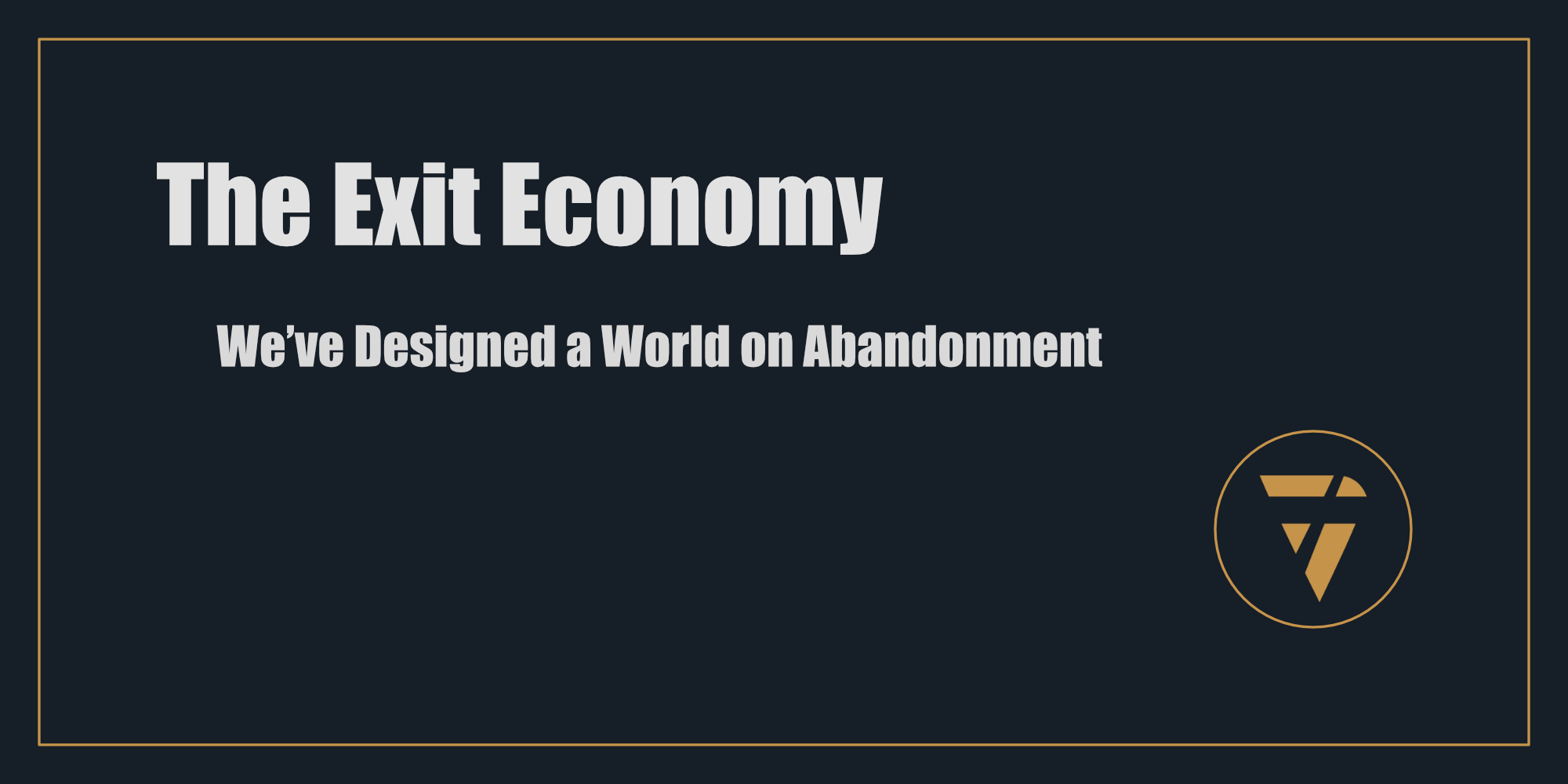The Exit Economy
We’ve Designed a World on Abandonment

What if the world we’ve built isn’t designed to grow, but to leave?
Everywhere we look, the stories we tell ourselves about success hinge on one pivotal moment: the exit. It’s the founder cashing out on their startup, the politician retiring with a legacy, the hedge fund flipping assets at just the right time. Our economy, our politics, even our culture—it’s all calibrated not to sustain, but to abandon.
This isn’t a theory. It’s a system.
We praise investment as the foundation of capitalism, the engine of progress. But in reality, it’s the afterthought, the prelude to the real endgame: the sale, the acquisition, the exit. Investment, in this world, is simply the setup for an elegant exit. And while exits drive wealth for the few, they leave hollow shells in their wake: communities gutted, workers discarded, ideas unrealized.
This is the Exit Economy—a world where success isn’t about what you build, but how quickly and lucratively you leave it behind.
The Myth of Investment
Investment should mean creation. It should mean patience, risk, and commitment—the act of nurturing something until it thrives. But the modern economic narrative twists this. Venture capitalists, angel investors, and even governments rarely fund ventures for their longevity. They fund them for their exit potential.
Take Silicon Valley, the cathedral of the Exit Economy. The metrics of success are not sustainability, innovation, or community impact—they’re how fast you can get acquired or go public. Every pitch deck is a Trojan horse, crafted to show the treasure inside, without revealing how fragile the structure is. When the acquisition comes, founders cash out, and workers face layoffs. Communities, once promised a revolution, are left with crumbling promises.
This isn't entrepreneurship. It's extraction.
The Human Cost of the Exit Economy
Exits don’t just drain wealth from companies—they hollow out the foundations of society.
Consider the gig economy: platforms like Uber or DoorDash are built not for longevity but for scale and eventual sale. These businesses rely on a disposable workforce—millions of drivers and delivery workers—who get no benefits, no security, and no future. They aren’t employees; they’re stopgaps. Their work supports a system designed to move on without them.
Or look at real estate markets. Homes are no longer homes; they’re speculative assets. Investors flip properties for quick profit, driving up prices and displacing communities. What was once shelter is now a commodity in an endless game of financial musical chairs.
This obsession with exiting ripples into politics, too. Election cycles are just another form of short-termism: leaders focus on immediate wins—tax cuts, quick stimulus cheques—rather than tackling the structural issues that would take years to fix.
We are a society running from itself, one exit at a time.
How Did We Get Here?
The roots of the Exit Economy stretch deep into history. Colonial empires didn’t settle new territories to build lasting communities; they came to extract resources and leave. Industrial magnates of the 19th century didn’t reinvest profits into better working conditions or communities; they piled their wealth into financial markets. The 20th century’s embrace of financial capitalism solidified the paradigm: money isn’t made by making—it’s made by selling.
Today, technology accelerates this process. Where once it took decades to scale and exit, now it happens in years. Data, algorithms, and speculative bubbles allow for faster flips, quicker profits, and deeper disconnection.
The result is a system optimized not for growth, but for abandonment.
Read my work on no exit investment systems. That’s how money actually works, without the bullshit.
What Happens If We Stay?
Here’s the radical thought: what if we didn’t leave?
Imagine businesses designed to grow for decades, not just for acquisition. Communities where investments in housing, infrastructure, and education aren’t about short-term returns but long-term impact. A political system that rewards foresight, not just optics.
But this requires rewriting the rules.
- Incentivize Staying Power: Tax systems currently reward capital gains over income, giving outsized benefits to those who sell. Let’s reverse that—reward long-term ownership and penalize quick flips.
- Redefine Success: Businesses and governments should measure success in impact, not just profit-taking. This means valuing worker retention, community contributions, and environmental sustainability.
- Shift the Narrative: Popular culture glorifies the "exit hero"—the founder who sells for billions. We need new stories, new heroes: the entrepreneurs who reinvest, the leaders who build for the next generation, the communities that endure.
Act Before They Get Out
The Exit Economy is not inevitable. It’s a choice. It’s encoded in policies, norms, and systems we’ve designed—and that means it can be redesigned.
It’s time to rethink how we build wealth, how we govern, and how we measure success. Let’s stop celebrating the exit and start honouring the investment. Because the real work, the real value, comes not in leaving, but in staying.
So I’ll leave you with this:
What would it look like if your business, your community, or your life wasn’t about the endgame—but the journey?
Let’s talk about it.
Subscribe now to explore how we can shift from extraction to creation—and build a world designed not for the exit, but for the future.
This Substack is reader-supported. To receive new posts and support my work, consider becoming a free or paid subscriber.
This is what I’m working on. Tell me what you think, I enjoy the conversation! Subscribe and follow the work in real time.
Thanks!
B
The Exit Economy isn’t an accident, it’s the design. Our culture glorifies the cash-out, the sale, the quick flip. But what if success wasn’t about leaving? What if it was about staying? Build for endurance, not extraction. That’s the real transformation.
PS -





